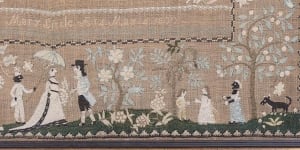Unseen New England: Re-envisioning Black Presence in Early American Art
Wednesday, May 15, 2024 6:00p -
7:30p
Where:
Online event
Admission:
FREE
Categories:
Art, History, Virtual
As early as 1825, a Connecticut preacher saw fit to make the statement that “slavery never existed here [in New England] to any considerable extent, and for years it has been a thing unknown.” Neither of these assertions was true. However, the speaker’s confidence was supported by a popular understanding that has remained common into the 21st century.
Despite powerful scholarship disproving New England’s wishful thinking about its past, the presence of early Black history in the region is still commonly forgotten. Drawing on doctoral research as well as Unnamed Figures, an ongoing exhibition project at the American Folk Art Museum and soon-to-be-opened exhibition at Historic Deerfield, this talk explores how, even in the context of such gaps in memory and the collective archive, historical images can further advance our understanding of Black experiences in early New England.
Contrary to what revisionist histories might imply in their diminishment of slavery in the region, a rare group of surviving portraits, overmantels, textiles, and other objects documents the presence of Black New Englanders in the 17th and 18th centuries. In comparison to established art historical tropes of Anglo-European imperial centers, this encapsulated history of Black representation in early New England is one of outliers.
The few works from these centuries that incorporate Black figures do so with a peculiarity that speaks to the distinctiveness of their colonial origins and to the contradictory expectations of household-centered slavery within the region.
Whereas imperial centers relied on long-standing Anglo-European tropes that rendered the Black figure as a highly codified and contained symbol, New England produced stranger compositions, in which patrons’ highly personal but conflicted relationships to enslaved people resulted in new levels of simultaneous intimacy and distance, displaying deep and complicated entanglements between Black and white experience.
This talk by Emelie Gevalt, curator of Unnamed Figures at the American Folk Art Museum in New York, will focus on a series of depictions of early African Americans in New England, including a late seventeenth-century portrayal of a Boston merchant; a family portrait from 1740s Matunuck, Rhode Island; a suite of overmantel landscapes from Revolutionary Connecticut; and a tribute to a formerly enslaved man in the form of a doll.
An examination of the idiosyncrasies of these images illuminates white artists’ and patrons’ conflicted relationships to slavery and Black presence, while simultaneously opening a window onto the lived experience of Black New Englanders.
Through the inclusion of little-known Black stories in relationship to these objects, this talk brings the supposed periphery into the center, questioning the assumption that the primary motivation behind a work is the most important basis for investigation, and aiming to restore in some small measure the realities of New England’s multicultural history amid a predominantly white visual record that has all but erased it.
-

SponsoredHidden Gems of Castle Hil Guided Nature Walk: Roundtrip Transportation from Boston Included!
Saturday, Nov 02, 2024 8:30a
Crane Estate

